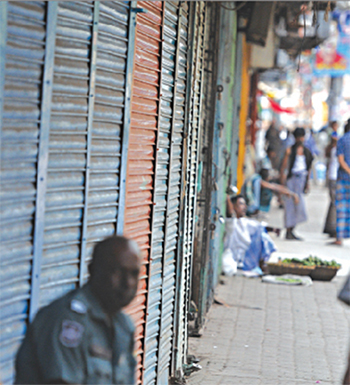News >> Business
Political chaos, energy crunch disrupt economic growth: MCCI
 14 Aug, 2013
14 Aug, 2013
Persistent political chaos, perennial power and energy shortage and undeveloped and inadequate infrastructure continue to disrupt the economic growth of the country, said Metropolitan Chamber of Commerce and Industries in its quarterly review released on Tuesday.
The export and import sectors are now facing a tough situation as majority of the banks have maintained large margins for opening letters of credit, said the MCCI in its economic situation report for April–June
‘Also, there is a fear that the export earnings might decrease in the coming days as the United States has recently suspended the Generalised System of Preferences for Bangladesh,’ said the chamber.
Besides, the credit growth in the private sector remains subdued and has remained much below the Bangladesh Bank’s programme for credit growth,’ the MCCI said.
‘The employment scenario of the migrant workers also worsened due to various types of restrictions imposed by major labour-importing countries, in particular the UAE, which has been the biggest recruiter of Bangladeshi workers in recent years.’
It said although Bangladesh Bank adopted ‘accommodative’ monetary policy slightly moving from its earlier ‘contractionary’ monetary policy, the domestic credit growth remained well below the target.
In the first 10 months of the FY 13, the rate of domestic credit growth was 9.5 per cent, compared to 15.2 per cent growth in the corresponding 10 months of the FY 12, said the report.
It said the tax revenue collection by the National Board of Revenue increased by 18.4 per cent in April 2013 but still fell short of the target due to repeated hartals and political instability in the country.
A lacklustre situation prevails in the country’s investment scenario, both in local and foreign direct investment, mainly because of political uncertainties, said the MCCI report.
‘Potential foreign investors are shying away from the country. However, Bangladesh received FDI of about $1.292 billion in 2012, the highest ever investment from abroad.
‘The ongoing political unrest, accompanied by shortage of power and energy, and scarcity of land are discouraging entrepreneurs to invest.
‘The state of the country’s capital market was disappointing most of the time in the FY 13. However, at the end of the FY, the Dhaka Stock Exchange witnessed a record turnover.
The MCCI report said the production of all food crops in the FY 13 other than wheat had fallen short of the annual target and also short
of the previous year’s production.
The combined production of aus and aman was 15.05 million tonnes in the FY 13, which was 0.53 per cent less than that of the FY 12 (15.13 million tonnes), and also 3.96 per cent short of the target, said the MCCI.
The data showed aman output rose by 0.78 per cent reaching at 12.90 million tonnes, but aus output witnessed a decline by 7.73 per cent with production falling to 2.15 million tonnes, it said.
The government is yet to finalise its estimate of boro but earlier said that boro acreage declined by nearly 0.02 million hectares in the FY 13 from 4.77 million hectares, said the MCCI.
‘The ongoing political instability is also hurting the country’s industrial growth and the recent BB statistics gives a disconcerting picture in that regard.
‘In the first 10 months of the FY 13, the import of capital machinery, industrial raw materials and intermediate goods declined sharply. Experts have attributed this to an unfavourable business environment due to the recent political violence and also the BB’s “contractionary” monetary policy pursued during the last one and a half years,’ said the report.
‘Despite some improvements, power and gas supplies still remained inadequate, and the growth in settlement of letters of credit for industrial raw materials and capital machinery registered a negative growth in July–April of the FY 13 compared to the corresponding period of the FY 12.
‘The power supply situation improved in the quarter, but the availability of power was still insufficient to meet the overall demand.’
It said load-shedding returned as the demand for power had gone up during the summer.
According to Bangladesh Power Development Board, the frequency and duration of load-shedding has increased due to production shortfall, limitations of distribution, and technical faults, the MCCI report said.
Exports grew by 6.2 per cent month-on-month in June 2013 on the back of frequent shutdowns amid political unrest, it said.
The import payments in the first 10 months of the FY 13 fell by 5.53 per cent to $28,203 million from $29,855 million in the corresponding months of the previous FY, the report said.
The MCCI said the services sector had recorded a slightly lower growth of 5.73 per cent in the FY 13 compared to 5.96 per cent in the previous FY mainly due to lower growth in agriculture and large-scale industry, and slower expansion in trade activities.
Source: new age

